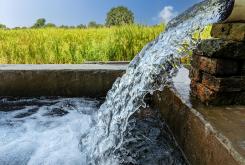The Future of Product Innovation Lives in Socially Responsible Chemistry

Increasing mandates from governments, industries, and watchdog groups, along with growing interest from the investment community, are driving a new emphasis on sustainability.
At Veolia | Water Tech, we value socially responsible chemistry as a driving force in our efforts to promote a circular economy by simplifying approaches, mitigating environmental harm, and reimagining the role of waste byproducts. Everything we do across our product lines fall within the framework of a multi-generation product plan that builds off the learnings of every project. Each time we iterate, we get smarter and make a better, more sustainable product.
We are doing more with less, focusing on more biodegradable materials and utilizing waste to create more efficient and less harmful solutions. Here are just a few examples.
Focusing on Solutions with Higher Biodegradability and Less Chemicals
Industrial raw water and waste plant operators are accustomed to using harsh chemicals to reduce biofouling, bacterial growth, and a hard-to-remove biofilm that forms on the reverse osmosis (RO) membrane systems they employ. These chemicals can be both highly caustic and highly acidic, with many adverse effects on the environment and the membrane itself, causing permanent damage that results in lower permeate water quality and shortens its overall lifespan.
Through our extensive research and knowledge of membranes, Veolia was able to identify and isolate naturally occurring enzymes to create an
Utilizing Dairy Byproducts to Reduce SO2 Emissions
Many coal-fired power plants are challenged with stricter regulatory compliance for emissions or are at-risk of closing due to competition from other generation sources like cleaner natural gas. In particular, tighter sulfur dioxide (SO2) emission limits (now at 95%) have essentially made the plants’ FGD scrubber systems -- most of which were installed in the 1980s and 1990s and only removed about 80% of SO2 – unable to comply with the new standards.
Using organic acids reprocessed from dairy production waste, Veolia created
Using a Paper Mill Byproduct to Reduce Water Use and Fugitive Emissions
Another common problem in the air is fugitive dust, the kind generated during the construction, maintenance, and operation of mining roads. It’s an environmental nuisance and a significant safety hazard as the inhalation of fugitive dust leads to increased health concerns. The dust can also hamper operational costs by increasing the frequency of equipment and vehicle maintenance.
To minimize the dust, mining and other operations sites would spray copious amounts of water or a harsh hydrocarbon product onto the road surfaces. These solutions weren’t very effective and only provided short-term relief from the issue. When a customer based in a water-scarce region asked Veolia to develop an alternative to minimize the amount of water and chemical products used, we looked to naturally occurring byproducts from trees.
Using a byproduct from the sulfide paper mill process, Veolia enhanced a leftover material typically burned or discharged to create a socially responsible
Expanding on the findings from previous products, the next generation of Veolia solutions will be more biodegradable, less harmful to the environment and equipment, and make better use of inherent waste. In its purest form, socially responsible chemistry will give us the tools to navigate the complex web of sustainability, economic, and societal problems that threaten our future.







